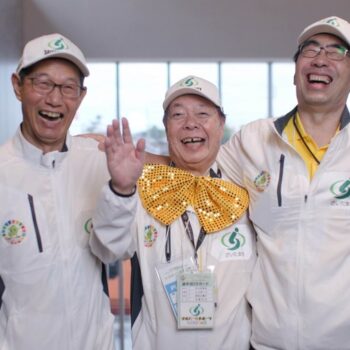David Wallerstein announced at the end of 2023 that he would transition to a new role at Tencent after more than 20 years as an executive at the company. His enthusiasm for innovation, love of technology, and commitment to more sustainable development made him a valuable and long-serving member of Tencent’s executive team.
Wallerstein is taking a new advisory role in 2024. Below are his reflections on his long career at Tencent and what he sees coming next.
When did you first cross paths with Tencent and what was the internet like at the time?
My first meeting with Tencent was in July 2000. The Internet was still primarily dial-up, with only a few million users, but something special was happening. Communities of users were rapidly forming via this fascinating new communications medium. Excitement and a sense of discovery permeated every aspect of life throughout China, and indeed around the world.
I personally was amazed by the ability of the Internet to transform all human relationships. To effectively erase time and space and make it possible to for individuals to meet around the world, at the speed of light. Pony and the founders had a deep fascination for the role of technology to improve human relationships—and when I joined, it gave us an opportunity to steadily internationalize a shared vision around a service ecosystem based on real time communication. Nonetheless, frankly, we were just having fun with daily challenges, working together, and building a new company. It didn’t feel like “work.” The times were so exciting, and in our early twenties, we had a good combination of energy, passion, and experience to work on new kind of company.
What was an early project or idea you worked on?
I started working in Silicon Valley in 2001, after Naspers completed its investment in Tencent. My work mode initially was two weeks in China, two weeks in the US. I traveled more or less like that until roughly 2009. I was pretty obsessed with all of our international relationships—ways to partner with leading international companies to help build our China business. My goal was for us to become the absolute best partner for international media, gaming and technology companies in China by finding scalable and sustainable ways to explore the market together. We had to become the partner of choice. In the very early days, we had a lot of key mobile handset relationships, as our Mobile QQ service was our key revenue driver.
From the early 2000s, it was fascinating to have a chance to build working relationships with our technology industry peers at a time when they were also in their earlier growth stages.
I hope this spirit and passion for partnering will always remain a critical part of our DNA. In particular, our international brand and partnering culture should always be treated as precious attributes.
You’ve seen Tencent – and the entire internet – develop so much in those 23 years. What was it like being on the inside of such a fast-growing internet company?
The past 23-plus years have been a whirlwind of non-stop excitement, and indeed, exploration. I went from being the first “non-Chinese” or “international” executive at the 45-person, relatively unknown, Tencent, to a “CXO” (Chief eXploration Officer) of one of the world’s largest corporations. We managed to continuously evolve our passion for serving people around the world with technology and pushed ourselves to support teams and entrepreneurs addressing critical challenges facing mankind.
As a person helping to build the company, it always felt like family to me. We were young when we started, and this was really our company to build together. We have many leaders in the company like me who have been involved for over 20 years or close to 20 years. Many people I remember when they first joined in their 20s, maybe just out of school. They got married, had kids, and now the kids are going off to college. But when I see these colleagues today, I still remember them from the first time we worked on a project together. I don’t see them as being in their late 40s, now maybe with some grey hair and a few extra pounds. We’re all still frozen in time in our twenties, in my view. I never read in a business strategy book that a company could be described like a family, but this has definitely been absolutely one of the most rewarding experiences in my entire life. I believe we definitely got this right at Tencent.
What changes have you seen inside Tencent during your time with the company?
For us early executives and managers in the company, I don’t think there was one amongst us who you could say was a classically trained professional. We lived and breathed every detail of the business 24/7 based on our passion and raw capabilities. As an instant communications company, we quickly communicated between ourselves.
We basically just did everything all the time. Then as the company scaled over time, more professionals came in, doing very specific jobs, with specialized training. Of course as a company scales, professionalism and specialization are essential. However, there is a certain excitement of a seat-of-your-pants start up that is irreplaceable. Coming up with a new product idea, talking to an engineer, and seeing the feature go up in a few days—it’s an amazing way to work and feel the daily progress. Things like deciding on a whim to enter a new business area. Maintaining an entrepreneurial spirit is so important as a company scales, complementing all the extensive professional and more specialized talent throughout the company.
Is there a particular moment, or project, or achievement that is a highlight for you? What is it?
For me, I’m so grateful that, with our success, I found opportunities to ask what I felt were big questions. There was an important initiative around 2006 that I drove, called “CE”, or Customer Engagement. The most important aspect of the CE initiative to me was that we started talking very directly and openly about our passion for people as our fundamental driving force for our business. We started using a new kind of language in the company, one that deeply empathized with people and human needs. We started seeing technology more fundamentally as a tool that must improve human lives as the driving force. I did a few speeches around this topic then that I’m personally quite proud of. I feel like in those days we started to better articulate the key reasons why we’re excited to be in business, to be working with technology, to be at Tencent—the joy of fundamentally serving our users with experiences that improve their lives. Feeling the support and passion throughout the company for “CE” then was really an unforgettable experience.
What is next for you?
In 2024, I’ll be transitioning my role at Tencent to that of Senior Advisor to the Group.
Why did you decide that now is the right time to make a change?
An active role in our executive team demands a very high level of constant performance. Like an athlete on a top performing team, sometimes you might find yourself not jumping so high anymore, feeling the hits harder, and getting more exhausted on the court. Meanwhile, there’s a bench full of hungry, talented leaders looking for an opportunity on the court. It’s time to create space and opportunity for the next generation.
Personally, I’d like to be in more of a coaching role, thinking more about technology trends and global challenges, and finding new areas where technology evolution can have an essential impact.
What will be your focus in this new role?
As a Senior Advisor, I plan to continue to contribute on topics related to climate, FEW and human health. The theme of “improving human life universally with technological innovation” must always be the key driving force. I’ll continue to work on the development of green aviation and eVTOL, which represent a tremendous opportunity to better navigate our world with no emissions and a minimal resource footprint. eVTOL is an entirely new transportation modality that can open up many new opportunities and lifestyle approaches—not dissimilar to upgrading from horses to automobiles over 100 years ago.
Is there a piece of advice, or words of motivation, that you received during your career that you reflect on?
My entire Tencent career was not out of a job description or MBA course. For me, I just always really cared about anything I worked on. I wanted to build real relationships with the people I worked with. I think a lot can be said for just deeply owning your responsibilities and your work. It’s not just about working 24/7, it’s more about just always doing practical things constantly to see initiatives through, and constantly building human relationships. Why make a one-minute decision take two weeks? I always found it helpful to be willing to dive into challenging issues immediately, with a smile, in a collaborative way, and not by avoiding the issue. Also, you’re really only as good as your team, and it’s all about teamwork.
What advice do you have for young people just starting their careers in technology?
Build yourself from the ground up—don’t be superficial. That means, ask yourself “why” you are doing what you are trying to do. If you’re just doing it to make money, I think your success will be limited, because your incentive to make great decisions for people every day is limited. By your own definition, it’s all about you and your personal gain, your title, your status. However, if you really want to serve people with technology, and improve their lives, because you fundamentally care about them, now you’re bringing much more of your brain and your heart into your work. The question is always fascinating and will always have unlimited answers: What do people really need and why? Maybe they have needs that they aren’t very aware of? How can you improve lives in a way that people didn’t know was possible?
When planning a career, I think people can also ask themselves: what kind of impact do they want to have? What kind of work do they want to do for others to improve the world? I think young people who are very motivated to make a positive impact through their work are much more interesting job applicants. They stand out more and you feel that the talent can help drive the mission of the company.
Any parting thoughts?
It has been amazing to work with so many gifted people, globally and throughout Tencent. From my first hand view, I can truly see that the technology industry is comprised of exceedingly talented and optimistic individuals. It has been a pleasure to work with so many of these people both inside and outside of Tencent.





